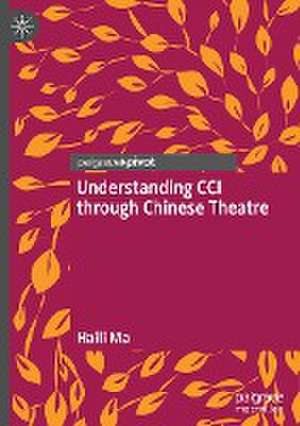Understanding CCI through Chinese Theatre
Autor Haili Maen Limba Engleză Hardback – 14 dec 2023
Preț: 319.98 lei
Nou
Puncte Express: 480
Preț estimativ în valută:
61.23€ • 66.72$ • 51.59£
61.23€ • 66.72$ • 51.59£
Carte tipărită la comandă
Livrare economică 23 aprilie-07 mai
Preluare comenzi: 021 569.72.76
Specificații
ISBN-13: 9783031458736
ISBN-10: 3031458737
Pagini: 162
Ilustrații: V, 162 p.
Dimensiuni: 148 x 210 mm
Greutate: 0.38 kg
Ediția:1st ed. 2024
Editura: Springer International Publishing
Colecția Palgrave Pivot
Locul publicării:Cham, Switzerland
ISBN-10: 3031458737
Pagini: 162
Ilustrații: V, 162 p.
Dimensiuni: 148 x 210 mm
Greutate: 0.38 kg
Ediția:1st ed. 2024
Editura: Springer International Publishing
Colecția Palgrave Pivot
Locul publicării:Cham, Switzerland
Cuprins
1. Introduction.- 2. Zhejiang all-female Yueju, from textile factory to creative cluster.- 3. Xi’an Qinqiang, ‘creative destruction’ for new urban branding.- 4. Suzhou Kunqu, conspicuous consumption for the new scholar middle class.- 5. Dongbei Errenzhuan, the rise and fall of a Chinese entertainment industry.- 6. Fujian Gaojiaxi, global illegal migrants’ opera consumption.- 7. Shanghai Huju, Opera Village verses Disneyland, the power of the tradition.- 8. Conclusion.
Notă biografică
Haili Ma is Associate Professor in the School of Performance and Cultural Industries at the University of Leeds, UK. Haili’s research focuses on Chinese theatre and the cultural and creative industries in global contexts. Before coming to the UK in 1997, Haili was a member of the Shanghai Luwan All-Female Yue Opera Company, specializing in Xiaosheng (male role). Haili is the author of Urban Politics and Cultural Capital: The Case of Chinese Opera (2015).
Textul de pe ultima copertă
This book examines the development of Cultural and Creative Industries (CCI) in China through the angle of Chinese Theatre, xiqu. It focuses on the political and socio-economic transition period at the turn of the 21st century, as China evolves from ‘Made in China’ to ‘Created in China’, highlighting associated class reconstruction and cultural production and consumption. There are many forms of Chinese Theatre, the most popular one throughout Chinese history to date is the sing-song drama, collectively refers to as xiqu, which currently has over 300 regional styles across China. In 2014, President Xi Jinping’s Beijing Talk on Arts and Literature, which serves as China’s latest Chinese Communist Party (CCP) ideological direction and cultural policy, stressed that ‘the future of Chinese cultural and creative industries is to be anchored on traditional art forms, such as xiqu’. Such Chinese cultural and creative industry distinction will be addressed in this book.
Haili Ma is Associate Professor in the School of Performance and Cultural Industries at the University of Leeds, UK. Haili’s research focuses on Chinese theatre and the cultural and creative industries in global contexts. Before coming to the UK in 1997, Haili was a member of the Shanghai Luwan All-Female Yue Opera Company, specializing in Xiaosheng (male role). Haili is the author of Urban Politics and Cultural Capital: The Case of Chinese Opera (2015).
Haili Ma is Associate Professor in the School of Performance and Cultural Industries at the University of Leeds, UK. Haili’s research focuses on Chinese theatre and the cultural and creative industries in global contexts. Before coming to the UK in 1997, Haili was a member of the Shanghai Luwan All-Female Yue Opera Company, specializing in Xiaosheng (male role). Haili is the author of Urban Politics and Cultural Capital: The Case of Chinese Opera (2015).
Caracteristici
Identifies the CCP’s role as the ‘central bank’, in driving forward Chinese CCI Argues that China’s CCI development of traditional performing arts mirrors that of the CCP Aims to bridge Western and Chinese theory, in the field of artistic socio-economics, to tackle Chinese CCI issues
